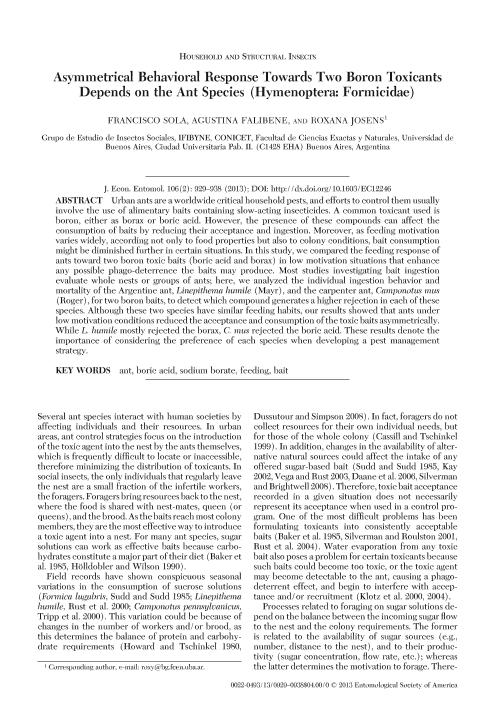Mostrar el registro sencillo del ítem
dc.contributor.author
Sola, Francisco Javier

dc.contributor.author
Falibene, Agustina

dc.contributor.author
Josens, Roxana Beatriz

dc.date.available
2017-07-11T19:14:20Z
dc.date.issued
2014-09
dc.identifier.citation
Sola, Francisco Javier; Falibene, Agustina; Josens, Roxana Beatriz; Asymmetrical behavioral response towards two boron toxicants depends on the ant species (Hymenoptera: Formicidae); Entomological Society of America; Journal Of Economic Entomology; 106; 9-2014; 929-938
dc.identifier.issn
0022-0493
dc.identifier.uri
http://hdl.handle.net/11336/20143
dc.description.abstract
Urban ants are a worldwide critical household pests, and efforts to control them usually involve the use of alimentary baits containing slow-acting insecticides. A common toxicant used is boron, either as borax or boric acid. However, the presence of these compounds can affect the consumption of baits by reducing their acceptance and ingestion. Moreover, as feeding motivation varies widely, according not only to food properties but also to colony conditions, bait consumption might be diminished further in certain situations. In this study, we compared the feeding response of ants toward two boron toxic baits (boric acid and borax) in low motivation situations that enhance any possible phago-deterrence the baits may produce. Most studies investigating bait ingestion evaluate whole nests or groups of ants; here, we analyzed the individual ingestion behavior and mortality of the Argentine ant, Linepithema humile (Mayr), and the carpenter ant, Camponotus mus (Roger), for two boron baits, to detect which compound generates a higher rejection in each of these species. Although these two species have similar feeding habits, our results showed that ants under low motivation conditions reduced the acceptance and consumption of the toxic baits asymmetrically. While L. humile mostly rejected the borax, C. mus rejected the boric acid. These results denote the importance of considering the preference of each species when developing a pest management strategy.
dc.format
application/pdf
dc.language.iso
eng
dc.publisher
Entomological Society of America

dc.rights
info:eu-repo/semantics/openAccess
dc.rights.uri
https://creativecommons.org/licenses/by-nc-sa/2.5/ar/
dc.subject
Ant
dc.subject
Boric Acid
dc.subject
Sodium Borate
dc.subject
Feeding
dc.subject
Bait
dc.subject.classification
Otros Tópicos Biológicos

dc.subject.classification
Ciencias Biológicas

dc.subject.classification
CIENCIAS NATURALES Y EXACTAS

dc.title
Asymmetrical behavioral response towards two boron toxicants depends on the ant species (Hymenoptera: Formicidae)
dc.type
info:eu-repo/semantics/article
dc.type
info:ar-repo/semantics/artículo
dc.type
info:eu-repo/semantics/publishedVersion
dc.date.updated
2017-07-11T13:24:16Z
dc.identifier.eissn
1938-291X
dc.journal.volume
106
dc.journal.pagination
929-938
dc.journal.pais
Estados Unidos

dc.description.fil
Fil: Sola, Francisco Javier. Consejo Nacional de Investigaciones Científicas y Técnicas. Oficina de Coordinación Administrativa Ciudad Universitaria. Instituto de Fisiología, Biología Molecular y Neurociencias. Universidad de Buenos Aires. Facultad de Ciencias Exactas y Naturales. Instituto de Fisiología, Biología Molecular y Neurociencias; Argentina
dc.description.fil
Fil: Falibene, Agustina. Consejo Nacional de Investigaciones Científicas y Técnicas. Oficina de Coordinación Administrativa Ciudad Universitaria. Instituto de Fisiología, Biología Molecular y Neurociencias. Universidad de Buenos Aires. Facultad de Ciencias Exactas y Naturales. Instituto de Fisiología, Biología Molecular y Neurociencias; Argentina
dc.description.fil
Fil: Josens, Roxana Beatriz. Consejo Nacional de Investigaciones Científicas y Técnicas. Oficina de Coordinación Administrativa Ciudad Universitaria. Instituto de Fisiología, Biología Molecular y Neurociencias. Universidad de Buenos Aires. Facultad de Ciencias Exactas y Naturales. Instituto de Fisiología, Biología Molecular y Neurociencias; Argentina
dc.journal.title
Journal Of Economic Entomology

dc.relation.alternativeid
info:eu-repo/semantics/altIdentifier/doi/http://dx.doi.org/10.1603/EC12246
dc.relation.alternativeid
info:eu-repo/semantics/altIdentifier/url/https://academic.oup.com/jee/article-lookup/doi/10.1603/EC12246
Archivos asociados
